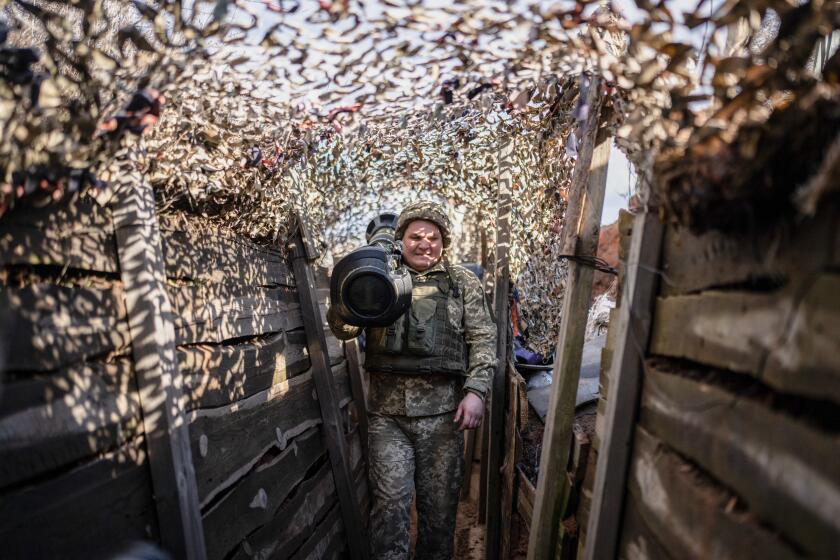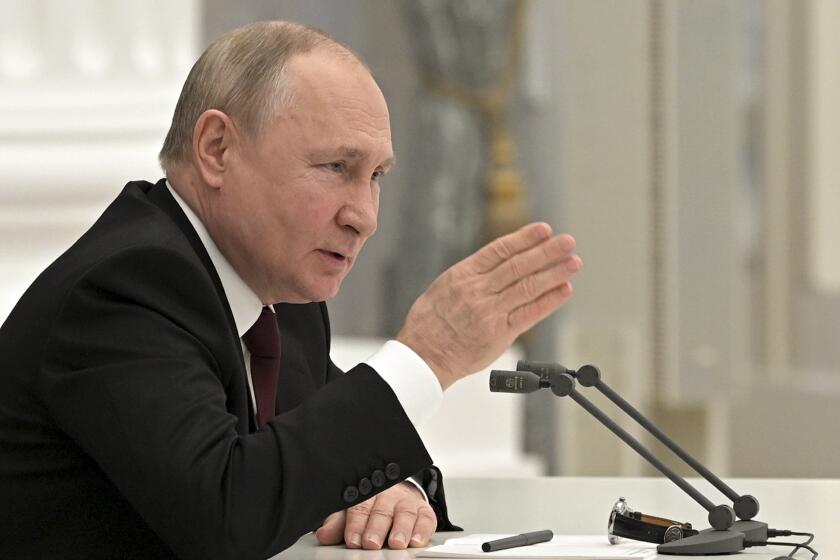Biden announces sanctions against Russia for invasion of Ukraine

President Biden announces additional sanctions on Russia for its invasion of Ukraine.
- Share via
WASHINGTON — President Biden announced Tuesday that the United States will levy its first tranche of economic sanctions against Moscow, responding in concert with European allies to what he described as “the beginning of a Russian invasion of Ukraine” while holding stronger measures in reserve.
“I’m going to begin to impose sanctions in response far beyond the steps we and our allies and partners implemented in 2014,” Biden said, a reference to the response that followed Russian President Vladimir Putin’s annexation of Crimea from Ukraine eight years ago.
“If Russia goes further with this invasion, we stand to go further with sanctions” against Moscow, he added.
U.S. sanctions will hit “large Russian financial institutions” in a way that will “cut off Russia’s government from Western financing,” Biden said from the White House, adding that similar measures would soon also target “Russian elites” and their family members, including the head of Russia’s Federal Security Service, known as the FSB, the main domestic security agency that succeeded the Soviet-era KGB.
Shortly after Biden’s announcement, Secretary of State Antony J. Blinken said he had called off his planned meeting this week in Geneva with his Russian counterpart, Sergei Lavrov.
“Now that we see the invasion is beginning and Russia has made clear its wholesale rejection of diplomacy, it does not make sense to go forward with that meeting at this time,” Blinken said.
Speaking to reporters in Washington with Ukrainian Foreign Minister Dmytro Kuleba at his side, Blinken said that he was not yet giving up completely on diplomacy but that Putin was fulfilling the worst of U.S. predictions of how he would attempt to attack and “subordinate” Ukraine.
“The United States and I personally remain committed to diplomacy if Russia is prepared to take demonstrable steps to provide the international community with any degree of confidence that it’s serious about de-escalating,” Blinken said. “But we will not allow Russia to claim the pretense of diplomacy at the same time it accelerates its march down the path to conflict and war.”
On Monday, Putin recognized two enclaves in the Donbas region of eastern Ukraine, Donetsk and Luhansk, as independent breakaway republics and ordered Russian troops into the areas already held by pro-Moscow separatists. He based the actions on his own assertion, forged in the aftermath of the Cold War and rearticulated Monday during a brazen speech in Moscow, that Ukraine, which declared its independence following the dissolution of the Soviet Union in 1991, had never had “real statehood.”
The EU’s top diplomat says that ‘Russian troops are on Ukrainian soil’ — but that it was not yet ‘a fully fledged invasion.’
The coordinated rollout of sanctions from the U.S. and other democracies, calibrated as a proportional response to Russian incursions into Ukraine, reflects an effort by Western allies to stay unified as they shift from trying to deter a conflict to containing one.
For several U.S. administrations, sanctions have become a favored tool to try to change the behavior of world leaders, but their effectiveness is murky at best. Sanctions, which usually ban the target from trade or commerce with U.S. entities including banks and freeze the target’s U.S.-based assets, seemed instrumental last decade in bringing Iranian leaders to the negotiating table over their nuclear aspirations.
In 2015, Iran agreed to suspend most production of nuclear materials in exchange for the lifting of sanctions that had crippled the country’s economy and blocked its ability to sell oil on the world market.
Russia is a different story. A series of sanctions that the U.S. and Europe previously placed on Russian entities and individuals has failed to alter Putin’s behavior, including his suspected poisoning of opponents and dissidents in countries outside Russia. Many experts say that unless sanctions can punish the Russian elites whose wealth and political self-interests bolster Putin, the measures will have little impact.
But the sanctions imposed Tuesday against two banks — the nation’s fifth-largest, VEB, and a government bank that funds Russia’s military — marked the first time the U.S. has frozen the assets of a major state-owned Russian bank, signaling the severity of the fuller sanctions package still in the offing. Deputy national security advisor Daleep Singh, who briefed reporters on the measures, said they were “only the sharp edge of the pain we can inflict,” stating that the White House is ready to take similar actions against Russia’s largest banks.
“No Russian financial institution is safe if this invasion proceeds,” Singh added.
Combined, the two banks hold $80 billion in assets and finance the Russian defense sector and economic development, according to a fact sheet from the White House. The measures will freeze the banks’ assets in the United States, prohibit U.S. individuals and businesses from being involved in any transactions with them, shut them out of the global financial system and foreclose access to the U.S. dollar.
The administration also said it plans to block U.S. individuals and financial institutions from participating in Russia’s secondary bond market, in an effort to cut off a key avenue for Russia to raise new money. Last year, the U.S. took similar action to block the purchase of Russian government bonds directly from state institutions.
Biden said that the U.S. would be repositioning troops already in Europe to shore up forces along NATO’s eastern flank, including moving an infantry battalion task force of approximately 800 personnel from Italy to the Baltic region. He emphasized that the movements were “totally defensive.”
“We have no intention of fighting Russia,” Biden said. “We want to send an unmistakable message, though, that the United States, together with our allies, will defend every inch of NATO territory and abide by the commitments we made to NATO.”
In the first hours of a new conflict in Europe, democratic powers worked to balance the need to punish Putin for violating Ukraine’s territorial sovereignty with the awareness that severe economic repercussions may not be enough to force the Russian autocrat to change course. In fact, officials say, Putin may use Western sanctions as a pretext to escalate the crisis.
In his speech Monday night, Putin told his nation that Ukraine was a Bolshevik-constructed amalgam created entirely by Russia. “Ukraine was never a true nation,” he said.
Kuleba, Ukraine’s foreign minister, called Putin’s speech a “horrific address,” saying the Russian leader “basically challenged the very — or rejected — he didn’t challenge it; he rejected the very existence of the Ukrainian state.”
Russian President Putin seems willing to sacrifice so much to occupy Ukraine. It is part of his attempt to rebuild a Russian empire loyal, essentially, to him.
Singh said the sanctions against Russia “are not an end in themselves ... [but] meant to prevent and deter a large-scale invasion of Ukraine that can involve the seizure of major cities, including Kyiv.”
He added that stronger measures remained on the table, including barring Russia from the SWIFT global banking network, a high-security communications platform used by more than 11,000 financial institutions around the world to send secure messages and payment orders; other measures could include export controls and additional sanctions on other banks and oligarchs, including Putin.
Germany took the first major step Tuesday toward punishing Putin, with Chancellor Olaf Scholz announcing that he has halted the process of certifying the controversial Nord Stream 2 gas pipeline from Russia, a still-incomplete project that Putin has coveted to gain greater leverage over Europe.
The European Union followed Germany’s lead, enacting sanctions against 351 Russian legislators who voted in favor of recognizing separatist regions in Ukraine. It also imposed sanctions against 27 other Russian officials and institutions in the defense and banking sectors. They also sought to limit Moscow’s access to EU capital and financial markets.
U.S. financial markets dropped quickly after the news from Berlin, clarifying how Americans and others around the world are likely to be affected by the conflict and its effect on energy markets.
British Prime Minister Boris Johnson also took action Monday, targeting five Russian banks and three wealthy oligarchs, individuals who have deep financial interests in energy and infrastructure and who already have been sanctioned by Washington.
Thus far, Republicans and Democrats alike have mostly backed Biden’s efforts to deter Putin. Now that those efforts seem to have failed, lawmakers in both parties have begun pushing the White House to respond with more vigor.
Rep. Adam B. Schiff (D-Burbank), chairman of the House Intelligence Committee, said the Biden administration’s actions will “render real and significant costs for President Putin, his inner circle and enablers.”
Get our L.A. Times Politics newsletter
The latest news, analysis and insights from our politics team.
You may occasionally receive promotional content from the Los Angeles Times.
However, he called for more serious actions. “I think the administration must go further, as I believe Putin is likely to go beyond the invasion of these two areas of Ukraine. Further sanctions should target the largest Russian banks — cutting them off from the world’s financial system — and in every other way raise the costs on Russia for its belligerence. Otherwise, we can only expect worse in the days and months ahead.”
Sen. Rick Scott (R-Fla.) said the U.S. “needs to implement maximum sanctions, just as we have on Iran. Now is the time to implement all measures to destroy the Russian economy, which predominately serves Putin and his thugs, and eliminate their ability to reshape European borders.”
Given that Putin views Ukraine’s independence after the fall of the Soviet Union as a tragedy of Russian history — articulated clearly in his speech Monday — many analysts wonder whether even the most serious of financial sanctions will be enough to dissuade him from a brazen effort to reconquer the former Soviet republic.
Putin knows that the U.S. and its North Atlantic Treaty Organization allies will almost certainly not send troops to defend Ukraine. He has also worked to inoculate Russia’s economy against the inevitable sanctions that will result from a prolonged invasion by building its currency reserves and establishing deeper economic ties with Beijing.
Times staff writer Jennifer Haberkorn contributed to this report.
More to Read
Sign up for Essential California
The most important California stories and recommendations in your inbox every morning.
You may occasionally receive promotional content from the Los Angeles Times.

















